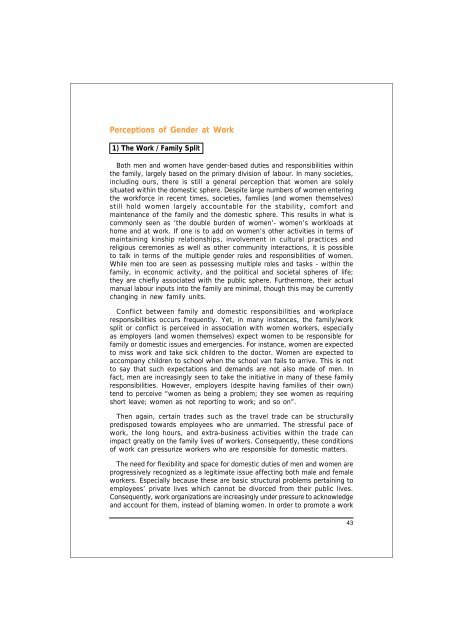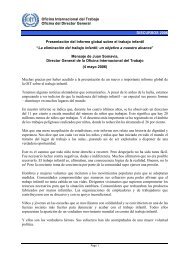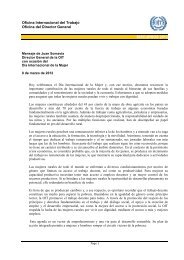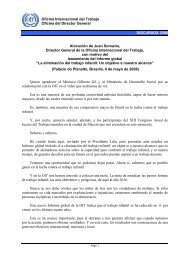Beyond Glass Ceilings and Brick Walls - International Labour ...
Beyond Glass Ceilings and Brick Walls - International Labour ...
Beyond Glass Ceilings and Brick Walls - International Labour ...
You also want an ePaper? Increase the reach of your titles
YUMPU automatically turns print PDFs into web optimized ePapers that Google loves.
Perceptions of Gender at Work<br />
1) The Work / Family Split<br />
Both men <strong>and</strong> women have gender-based duties <strong>and</strong> responsibilities within<br />
the family, largely based on the primary division of labour. In many societies,<br />
including ours, there is still a general perception that women are solely<br />
situated within the domestic sphere. Despite large numbers of women entering<br />
the workforce in recent times, societies, families (<strong>and</strong> women themselves)<br />
still hold women largely accountable for the stability, comfort <strong>and</strong><br />
maintenance of the family <strong>and</strong> the domestic sphere. This results in what is<br />
commonly seen as ‘the double burden of women’- women’s workloads at<br />
home <strong>and</strong> at work. If one is to add on women’s other activities in terms of<br />
maintaining kinship relationships, involvement in cultural practices <strong>and</strong><br />
religious ceremonies as well as other community interactions, it is possible<br />
to talk in terms of the multiple gender roles <strong>and</strong> responsibilities of women.<br />
While men too are seen as possessing multiple roles <strong>and</strong> tasks - within the<br />
family, in economic activity, <strong>and</strong> the political <strong>and</strong> societal spheres of life;<br />
they are chiefly associated with the public sphere. Furthermore, their actual<br />
manual labour inputs into the family are minimal, though this may be currently<br />
changing in new family units.<br />
Conflict between family <strong>and</strong> domestic responsibilities <strong>and</strong> workplace<br />
responsibilities occurs frequently. Yet, in many instances, the family/work<br />
split or conflict is perceived in association with women workers, especially<br />
as employers (<strong>and</strong> women themselves) expect women to be responsible for<br />
family or domestic issues <strong>and</strong> emergencies. For instance, women are expected<br />
to miss work <strong>and</strong> take sick children to the doctor. Women are expected to<br />
accompany children to school when the school van fails to arrive. This is not<br />
to say that such expectations <strong>and</strong> dem<strong>and</strong>s are not also made of men. In<br />
fact, men are increasingly seen to take the initiative in many of these family<br />
responsibilities. However, employers (despite having families of their own)<br />
tend to perceive “women as being a problem; they see women as requiring<br />
short leave; women as not reporting to work; <strong>and</strong> so on”.<br />
Then again, certain trades such as the travel trade can be structurally<br />
predisposed towards employees who are unmarried. The stressful pace of<br />
work, the long hours, <strong>and</strong> extra-business activities within the trade can<br />
impact greatly on the family lives of workers. Consequently, these conditions<br />
of work can pressurize workers who are responsible for domestic matters.<br />
The need for flexibility <strong>and</strong> space for domestic duties of men <strong>and</strong> women are<br />
progressively recognized as a legitimate issue affecting both male <strong>and</strong> female<br />
workers. Especially because these are basic structural problems pertaining to<br />
employees’ private lives which cannot be divorced from their public lives.<br />
Consequently, work organizations are increasingly under pressure to acknowledge<br />
<strong>and</strong> account for them, instead of blaming women. In order to promote a work<br />
43
















